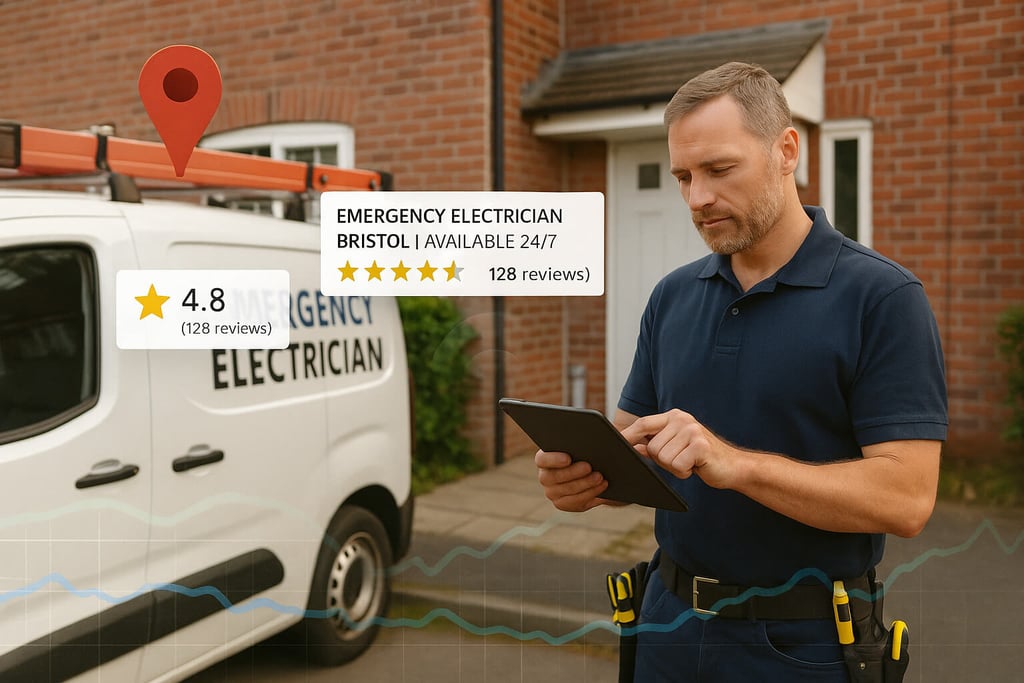SEOJet Flight Blog
Rank Higher on Google: SEO Guide for Service Based Businesses
Rank Higher on Google: SEO Guide for Service Based Businesses. Learn how to rank higher in search results! This SEO guide helps improve Google rank and search engine ranking.
SEO FOR LOCAL COMPANIES
Ardene Stoneman
5/9/20255 min read


How to Rank Higher on Google as a Service Provider
If you're a service provider, ranking higher on Google isn't just helpful - it’s the main way people find you.
Whether you're a plumber, solicitor, electrician, or digital consultant, your potential customers are using Google search to find someone like you.
If you're not visible in those search results, you're losing business to competitors who are.
This article explains how to rank higher on Google specifically as a service-based business.
It covers what affects your search engine ranking, how to set up your Google Business Profile properly, how to match search intent, and what steps you can take to move up the rankings - especially in local and map results.
Outline
Why Google ranking matters for service providers
What it means to rank higher on Google
Key SEO basics for service-based businesses
What affects your Google search ranking as a service provider?
How to improve your Google Business Profile
How search intent shapes your visibility
Local SEO tips to help Google understand your service area
On-page SEO for services: what to include
Getting high-quality backlinks for a service site
Tracking your SEO results with Google Analytics and Search Console
Using Google Ads without damaging your SEO
Common issues that stop service providers ranking
Mobile and technical improvements that help you rank higher
Tools to monitor ranking on Google
Summary: how to rank well and stay visible
1. Why Google ranking matters for service providers
When someone needs a service, they go straight to Google. If you’re not near the top of the results for searches like “plumber in Bath” or “family lawyer Bristol,” you're missing out.
Higher Google search rankings lead to more traffic, more enquiries, and more work.
Most people won’t scroll past the top few listings - especially on mobile - so appearing near the top of the page is key to growing your service business.
2. What it means to rank higher on Google
To rank higher means your site appears above others in Google’s organic search results. You can rank high on Google in two main areas:
The local map pack, shown for local services with a Google My Business listing.
The organic results, where your website pages are ranked based on SEO.
Both matter. Ideally, you want your business to appear in both the map and the standard listings. This builds trust and increases the chance of a click.
3. Key SEO basics for service-based businesses
If you're just starting to optimise your site, focus on the foundations of SEO:
Relevance: Make sure your website clearly states what services you offer and where.
Accessibility: Google can only rank content it can access and understand.
Structure: Use clear page layouts, headings, and internal links.
Trust signals: Include real contact details, reviews, and location info.
Search engine optimisation isn’t about tricks - it’s about clarity, accuracy, and technical quality.
4. What affects your Google search ranking as a service provider?
Google uses many signals when ranking a service business. Here are some that matter most:
Your Google Business Profile and how complete it is
Website content, especially location-based service pages
Reviews and online reputation across Google and the web
Backlinks from relevant and trusted sites
Technical performance, including mobile usability and page speed
If you want to rank higher on Google, these areas should be part of your SEO plan.
5. How to improve your Google Business Profile
Your Google Business Profile (formerly Google My Business) is essential for service providers. It feeds data to Google Maps and the local pack. Here’s how to optimise it:
Fill in all business information - name, address, phone, services, hours
Add photos of your work and business location
Write a detailed business description with keywords
Use categories that describe what you offer
Encourage happy clients to leave reviews regularly
This helps Google understand what your business does and where it’s based, which is vital for local rankings.
6. How search intent shapes your visibility
You need to align your content with the actual search intent behind the query. For example:
“boiler repair near me” implies immediate service
“how to fix a dripping tap” implies a DIY interest
You want to rank for the first one if you're a plumber. To do that, your service page needs to clearly show you offer the service, where you offer it, and how quickly you can respond.
If your content doesn’t match what the user is really looking for, it won’t rank - no matter how good your SEO is.
7. Local SEO tips to help Google understand your service area
Local SEO focuses on improving your visibility in local search results. Here's what helps:
Create separate pages for each service-location combo (e.g. “Plumbing Services in Weston-super-Mare”)
Use your town or city name in headings, title tags, and body copy
List your business in reputable local directories
Use schema markup to highlight business information like address and opening hours
The goal is to make it easy for Google to match your business to people searching for your service in a specific place.
8. On-page SEO for services: what to include
When creating a service page, include the following:
A clear H1 that includes the service and location
Description of the service and what’s included
Customer testimonials or short reviews
Clear contact or call-to-action button
Mention of relevant nearby areas you cover
Internal links to other services or location pages
Don’t try to stuff keywords. Just make it easy for Google to understand what you do and where.
9. Getting high-quality backlinks for a service site
Links still matter for SEO. As a service provider, focus on these types:
Local partnerships (e.g. other local businesses)
Local news or community websites
Industry bodies or associations
Suppliers who might link to their clients or installers
Avoid buying links or using link farms. Google considers link quality a strong ranking factor and can penalise unnatural ones.
10. Tracking your SEO results with Google Analytics and Search Console
Use these two free tools:
Google Analytics tracks how people find and use your website. It shows traffic sources, most visited pages, and user behaviour.
Google Search Console shows what search queries your pages appear for, and if Google can index your site properly.
Together, they help you understand how well you're ranking on Google, and where to improve.
11. Using Google Ads without damaging your SEO
Running Google Ads can get you visibility in the top ad section, but it won’t help your organic ranking. The two are separate.
However, ads can:
Bring in short-term leads while SEO improves
Highlight which search queries convert best
Boost brand searches, which can support your organic SEO indirectly
Just don’t assume ads will replace the need to rank higher in organic search results.
12. Common issues that stop service providers ranking
Some of the most common problems that block rankings include:
No clear service pages or keyword targeting
Missing or incomplete Google Business Profile
Poor mobile experience or slow page speed
No location-specific content
No backlinks or local citations
Outdated content or broken links
All of these make it harder for Google to understand and trust your site.
13. Mobile and technical improvements that help you rank higher
Google ranks your site based on its mobile version first. Make sure:
It works properly on all screen sizes
Fonts are legible, and buttons are easy to tap
Pages load in under 3 seconds
You’re using HTTPS and have no major errors in Search Console
Technical fixes may not be exciting, but they’re essential if you want to rank higher on Google.
14. Tools to monitor ranking on Google
To track how you're doing, use:
Search Console (free, for basic performance tracking)
Google Analytics (traffic and behaviour data)
Manual searches (to spot test key phrases in your area)
Rank tracking tools like SERPRobot, Nightwatch, or Ahrefs
Rank tracking gives you a snapshot of where your site sits for important keywords. Use it to spot drops early and stay ahead of competitors.
15. Summary: how to rank well and stay visible
Here’s a quick recap of what helps service providers rank higher on Google:
Complete and optimise your Google Business Profile
Create clear, well-structured service pages with local keywords
Align each page with specific search intent
Improve mobile speed and usability
Build quality backlinks from local and industry sources
Use Analytics and Search Console to monitor your SEO results
Keep content fresh and accurate
Track your rankings and adapt as needed
Want to rank higher on Google and bring in more work? At SEOJet, we help service providers improve search visibility and drive local enquiries. No gimmicks - just reliable SEO that gets results.
Services
Contact Us
Newsletter Signup
sales@seojet.co.uk
01934 289 404
© 2025. All rights reserved.


Locations
Weston-super-Mare
Somerset
Bristol
9am - 6pm, Monday to Friday
Suite 2, Unit 7, 12 Beaufigter Rd, Weston-super-Mare, BS24 8EE
